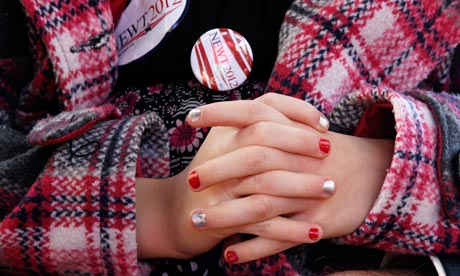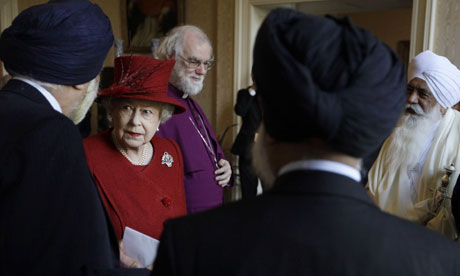By PAULA KIRBY/RDFRS UK - RICHARDDAWKINS.NET
Added: Tue, 14 Feb 2012 00:28:36 UTC
We are posting below the text of the first of two Press Releases that have been issued by the Richard Dawkins Foundation for Reason and Science (UK) today, revealing the results from a major national survey of the religious and social attitudes of UK Christians.
RDFRS UK commissioned Ipsos MORI to carry out the research in the week immediately following the 2011 UK Census. It explored in depth the extent to which adults recorded as Christian in the 2011 UK Census (or who would have been recorded as Christian, if they had answered the question) believe, know about, practise and are influenced by Christianity, as well as their reasons for having described themselves as Christian in the Census.
Why did we commission this research?
The number of people selecting 'Christian' on Census forms has traditionally been rather high (in 2001 it was 72%), and this percentage has regularly been seized on by those trying to justify or increase religious influence in public life. Clergy, politicians and Christian lobbyists love to use such results to declare that the UK is a Christian nation and imply that there is therefore popular support for Christian influence in public life and hostility to secularism. Whether the topic is the automatic places for Church of England Bishops in the House of Lords, or the provision of hospital chaplains from NHS budgets, or the continued legal requirement for all pupils in state schools in England and Wales to take part in a daily act of 'broadly Christian worship', the invariable refrain is, 'But these things are appropriate because Britain is a Christian country!'
Indeed, just last Friday, in the wake of the court decision on the question of Council Prayers, the Bishop of Exeter claimed, right on cue:
Every time there is a survey of religious beliefs in this country, around 70 percent of the population profess religious faith and will also talk about saying private prayers. We are actually talking about something that still accords with the mood and the outlook of the majority.
Our research shows otherwise.
Not only has the number of UK adults calling themselves Christian dropped dramatically since the 2001 Census – our research suggests that it is now only 54% – even those who still think of themselves as Christian show very low levels of religious commitment:
• Only about a third of what we shall call 'Census-Christians' cited religious beliefs as the reason they had ticked the Christian box in the 2011 Census
• 37% of them have never or almost never prayed outside a church service
• Asked where they seek most guidance in questions of right and wrong, only 10% of Census-Christians said it was from religious teachings or beliefs
• Just a third (32%) believe Jesus was physically resurrected; half (49%) do not think of him as the Son of God
• And when given 4 books of the Bible to select from and asked which was the first book of the New Testament, only 35% could identify Matthew as the correct answer.
And there's much, much more!
Remember: these percentages do not refer to the population as a whole, but to those who self-identified as Christian in the 2011 Census (or who would have done so, had they answered the question). So: only 54% of the population say they are Christian, and of these, only 35% could correctly identify the first book of the New Testament.
Even more significantly, our research revealed overwhelming opposition to religious influence in public life - but we cover that in Press Release 2, which is being posted in a separate thread.
But didn't we know all this already?
We suspected it. Recent Social Attitudes Surveys have implied it, simply because the attitudes of the population as a whole are so strongly secular. But suspecting it is not the same as evidence. Pro-religious lobbyists regularly make assumptions that the people shown as Christian in the Census support them and their agendas. We haven't made any assumptions at all. We identified people shown as Christian in the 2011 Census and asked them about their beliefs and attitudes. And they told us. And the results are even clearer – and even more devastating for the pro-religious lobbyists – than we had dared to hope.
This research, commissioned by RDFRS UK, gives us the clearest picture yet of the beliefs and attitudes of UK Christians in 2011. Hard evidence. Independently produced by one of the most reputable names in opinion polling.
RDFRS UK Press Release 1:
14 February 2012
Only 1 in 10 UK Christians seeks moral guidance from religion
UK residents who think of themselves as Christian show very low levels of Christian belief and practice, according to new research.
A poll carried out by Ipsos MORI for the Richard Dawkins Foundation for Reason and Science (UK) in the week after the 2011 Census focused on the beliefs, attitudes and practices of UK adults who say they were recorded as Christian in the 2011 Census (or would have recorded themselves as Christian had they answered the question).
When asked why they think of themselves as Christian, the research found that fewer than three in ten (28%) say one of the reasons is that they believe in the teachings of Christianity.
People are much more likely to consider themselves to be Christian because they were christened or baptised into the religion (72%) or because their parents were members of the religion (38%) than because of personal belief.
As many as half (50%) do not think of themselves as religious and less than a third (30%) claim to have strong religious beliefs.
Indeed, many Christian practices, including regular reading of the Bible and prayer outside church services, appear to be unsupported amongst respondents self-identifying as Christian:
• One in six (15%) admits to having never read the Bible outside a church service, with a further one in three (36%) not having done so in the previous three years;
• The majority (60%) have not read any part of the Bible, independently and from choice, for at least a year;
• Around two thirds (64%) were not able to identify Matthew as the first book of the New Testament, when given only four answers to choose from;
• Over a third (37%) have never or almost never prayed outside a church service, with a further 6% saying they pray independently and from choice less than once a year; and
• Only a quarter (26%) say they completely believe in the power of prayer, with one in five (21%) saying they either do not really believe in it or do not believe in it at all.
At the same time, many who self-identify as Christian hold beliefs that some churches would consider to be incompatible with traditional Christian teaching, such as astrology and reincarnation (27% in each case), ghosts (36%) and fate (64%).
The low level of religious belief and practice among those calling themselves Christian is reflected in church attendance. Apart from special occasions such as weddings, funerals and baptisms, half (49%) had not attended a church service in the previous 12 months. One in six (16%) have not attended for more than ten years, and a further one in eight (12%) have never attended at all.
Fewer than half (44%) of the self-identifying Christians had participated in any non-church-based religious activity, such as watching or listening to a religious service on TV, radio or the internet, in the previous year.
Asked why they had been recorded as Christian in the 2011 Census, only three in ten (31%) said it was because they genuinely try to follow the Christian religion, with four in ten (41%) saying it was because they try to be a good person and associate that with Christianity.
But when asked where they seek most guidance in questions of right and wrong, only one in ten (10%) said it was from religious teachings or beliefs, with over half (54%) preferring to draw on their own inner moral sense.
Only half (54%) of the self-identifying Christians describe their view of God in Christian terms, with the others using the term in the sense of the laws of nature (13%), some form of supernatural intelligence (10%), or whatever caused the universe (9%). Six per cent do not believe in God at all.
Just a third (32%) believe Jesus was physically resurrected, with one in five (18%) not believing in the resurrection even in a spiritual sense; half (49%) do not think of Jesus as the Son of God, with one in twenty-five (4%) doubting he existed at all.
Asked to select which one statement best describes what being a Christian means to them personally, 40% chose 'I try to be a good person' and around a quarter (26%) chose ‘It's how I was brought up'. Around one in six (16%) selected the statement ‘I have accepted Jesus as my Lord and Saviour' and less than one in ten (7%) chose 'I believe in the teachings of Jesus'.
Overall, the findings suggest that the number of UK adults self-identifying as Christian has fallen significantly since the 2001 Census. This research found that at the time of the 2011 Census, just over half (54%) the public thought of themselves as Christian, compared with almost three-quarters (72%) in the 2001 Census.
Welcoming the findings of the research, Richard Dawkins said:
"Despite the best efforts of church leaders and politicians to convince us that religion is still an important part of our national life, these results demonstrate that it is largely irrelevant, even to those who still label themselves Christian.
“When it comes to belief, practice or even the most elementary knowledge of the Bible, it is clear that faith is a spent force in the UK, and it is time our policy-makers woke up to that reality and stopped trying to impose beliefs on society that society itself has largely rejected.
“In the past, there have often been attempts to use the Christian figure in the Census to justify basing policy on the claim that faith is important to the British people. This time, any attempt to do so will clearly be inexcusable."
ENDS
NOTES TO EDITORS:
The Richard Dawkins Foundation for Reason and Science (UK) is a registered charity which promotes rationalism, humanism and science in a quest to overcome religious fundamentalism, superstition, intolerance and suffering.
Ipsos MORI interviewed a representative sample of 2,107 adults aged 15+ across the United Kingdom. From this sample, a total of 1,136 adults defined themselves as Christians. Interviews were conducted face-to-face over the period 1st April to 7th April, 2011. Data are weighted to match the profile of the population.
A copy of the data relating to this Press Release may be found here.
Richard Dawkins will be available for press interviews on 14, 15 and 16 February 2012
For further information contact: Paula Kirby E: paulakirby@richarddawkins.net
TAGGED: ANNOUNCEMENTS, RELIGION, SECULARISM, SOCIETY


 Dawkins Foundation care packages go to atheists in foxholes
Dawkins Foundation care packages go to atheists in foxholes In the Spirit: Some florists won't deliver to atheist
In the Spirit: Some florists won't deliver to atheist The Archbishop of Canterbury and atheist Professor Richard Dawkins are set to go head to head to discuss man's greatest question.
The Archbishop of Canterbury and atheist Professor Richard Dawkins are set to go head to head to discuss man's greatest question. Tensions between religion and science will persist unless believers recognise that skepticism is a hallmark of science.
Tensions between religion and science will persist unless believers recognise that skepticism is a hallmark of science.



 Bishop Langrish of Exeter said Britain remained a religious nation. “Every time there is a survey of religious beliefs in this country, around 70 percent of the population profess religious faith and will also talk about saying private prayers. We are actually talking about something that still accords with the mood and the outlook of the majority.”
Bishop Langrish of Exeter said Britain remained a religious nation. “Every time there is a survey of religious beliefs in this country, around 70 percent of the population profess religious faith and will also talk about saying private prayers. We are actually talking about something that still accords with the mood and the outlook of the majority.” Fri. Feb10, 1pm EST (GMT-5) - Rebroadcast of Lawrence Krauss/Richard Dawkins ASU event - Lawrence Krauss will answer questions live after the broacast
Fri. Feb10, 1pm EST (GMT-5) - Rebroadcast of Lawrence Krauss/Richard Dawkins ASU event - Lawrence Krauss will answer questions live after the broacast
